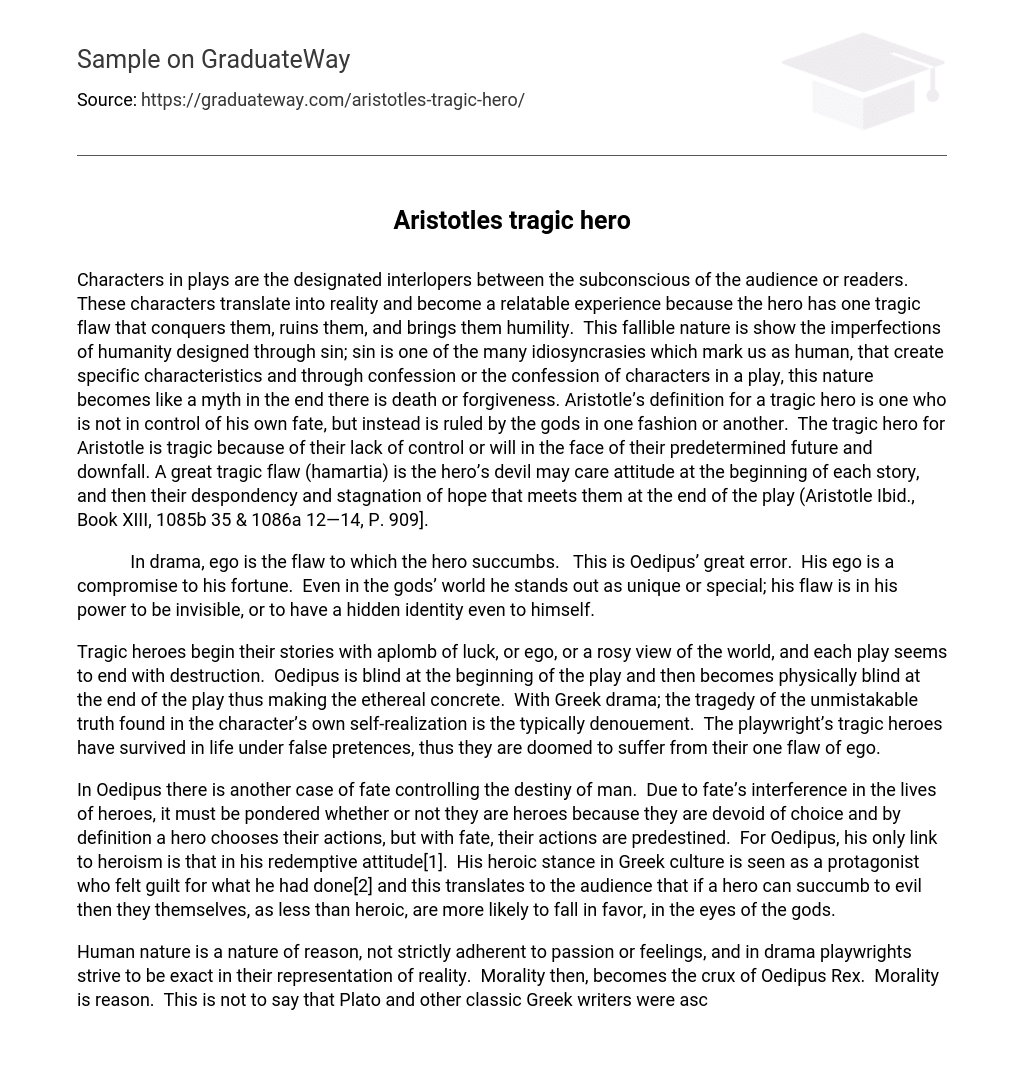Characters in plays are the designated interlopers between the subconscious of the audience or readers. These characters translate into reality and become a relatable experience because the hero has one tragic flaw that conquers them, ruins them, and brings them humility. This fallible nature is show the imperfections of humanity designed through sin; sin is one of the many idiosyncrasies which mark us as human, that create specific characteristics and through confession or the confession of characters in a play, this nature becomes like a myth in the end there is death or forgiveness. Aristotle’s definition for a tragic hero is one who is not in control of his own fate, but instead is ruled by the gods in one fashion or another. The tragic hero for Aristotle is tragic because of their lack of control or will in the face of their predetermined future and downfall. A great tragic flaw (hamartia) is the hero’s devil may care attitude at the beginning of each story, and then their despondency and stagnation of hope that meets them at the end of the play (Aristotle Ibid., Book XIII, 1085b 35 & 1086a 12—14, P. 909].
In drama, ego is the flaw to which the hero succumbs. This is Oedipus’ great error. His ego is a compromise to his fortune. Even in the gods’ world he stands out as unique or special; his flaw is in his power to be invisible, or to have a hidden identity even to himself.
Tragic heroes begin their stories with aplomb of luck, or ego, or a rosy view of the world, and each play seems to end with destruction. Oedipus is blind at the beginning of the play and then becomes physically blind at the end of the play thus making the ethereal concrete. With Greek drama; the tragedy of the unmistakable truth found in the character’s own self-realization is the typically denouement. The playwright’s tragic heroes have survived in life under false pretences, thus they are doomed to suffer from their one flaw of ego.
In Oedipus there is another case of fate controlling the destiny of man. Due to fate’s interference in the lives of heroes, it must be pondered whether or not they are heroes because they are devoid of choice and by definition a hero chooses their actions, but with fate, their actions are predestined. For Oedipus, his only link to heroism is that in his redemptive attitude[1]. His heroic stance in Greek culture is seen as a protagonist who felt guilt for what he had done[2] and this translates to the audience that if a hero can succumb to evil then they themselves, as less than heroic, are more likely to fall in favor, in the eyes of the gods.
Human nature is a nature of reason, not strictly adherent to passion or feelings, and in drama playwrights strive to be exact in their representation of reality. Morality then, becomes the crux of Oedipus Rex. Morality is reason. This is not to say that Plato and other classic Greek writers were ascetic; rather they placed passion, and feelings in their plays but the ethics of humanity are tied into the good of a person because reasonably, being virtuous, or good leads a character to happiness or release at the end of a modern play. The word for this given by Plato is eudemonism, which means blissful.
As a Greek hero, Oedipus is controlled by fate: His remittance of gouging his eyes shows that he is a strong hero because of his debt payment of sight. For Oedipus the flaw could be contained within the word ego. Ego in answering the sphinx riddle and unbeknownst to him killing his birth father, marrying his mother, having children; ego accounts for all of Oedipus’s actions, and it is fate which had designed ego and thus was the ultimate ruler of Oedipus.
Works Cited
Aristotle. <http://olldownload.libertyfund.org/EBooks/Plato_0407.pdf>
Sophocles. (1977). The Oedipus Cycle. Harcourt Inc. Florida.
[1] The Greeks believed that a hero had one tragic flaw and that flaw was their downfall. Every hero had one, and for Oedipus his flaw was exerted best when he gouged out his own eyes.
[2] He married his mother and killed his father, all through the design of fate and the Delphi oracle.





